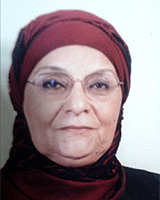"I Feel Very Close to Heidelberg and Heidelberg University"

Prof. Dr. Nahed El Dib, Professor Emeritus of German Studies at Cairo University, Egypt
Doctoral student at the Department of German Language and Literature of Heidelberg University from 1975 to 1979 with a scholarship of the Egyptian government; returned to Heidelberg In July 2013 with HAIreconnect
Why did you decide to come to Heidelberg University?
After I successfully defended my master's thesis at Cairo University, I was awarded a scholarship that enabled me to earn my doctoral degree in a German-speaking country (West Germany, East Germany or Austria). At the time, there was no way to earn a PhD in German studies at an Egyptian university. By coincidence, I met a Heidelberg professor of German studies, Eberhard Lämmert, in the office of the Dean of my faculty. He was kind enough to offer supervising my doctoral thesis in Heidelberg, for which I am grateful to this day.
What were your experiences in Heidelberg?
I spent almost five years in Heidelberg. In the first few months, I struggled to find accommodation and had to stay in various hotels, until another lucky chance led me to the "Bauhütte Heidelberg" housing cooperative, which helped me find a flat in Eppelheim. This enabled me to bring my husband and my two children, then four and two years old, to Heidelberg. My academic experience was an absolutely positive one. I had very few problems, both in my main subject (modern German literature) and in my two secondary subjects (Oriental studies and German linguistics) and passed all three examinations during the term of my scholarship.
Thanks to our housing cooperative flat, my family and I had the chance to meet colleagues from other countries and cultural backgrounds, and so gained an early understanding of the much-discussed concept of interculturality. To this day, my family and I regard Heidelberg as our second home town. Every visit to Germany reminds us of the good times we spent in Heidelberg – in the University Library, at the castle and on the funicular railway, in the Children's Paradise and many other places.
How did your career continue after your time in Heidelberg?
After I received my PhD, I returned to Cairo University and began my academic career in 1979 in the Department of German Studies of the Faculty of Philosophy – I started out as a lecturer, then became assistant professor and finally professor. From 1994 to 2004, I was on leave from the university to head the Arabic Department of the German Evangelical Grammar School Cairo (DEO), a German-Egyptian school with 1,200 students of all levels from kindergarten to high school. During this time, I also acted as liaison between the Egyptian Ministry of Education and the Conference of German Ministers of Cultural Affairs.
I returned to Cairo University in 2004 and headed the Department of German Studies for the next two years. During this time, my colleagues in the department and I organised an international conference on German studies under the heading "Wege über Grenzen" (Crossing Boundaries). In 2005 the "Supreme Council of Universities Egypt" appointed me a member of the Promotion Commission for Assistant Professors and Professors, a part-time position that I held until 2013. I currently hold similar positions in the commissions of Al-Azhar University in Cairo and at the Egyptian Academy of Arts. In 2005 I became head of the "Centre for Foreign Languages and Translation" at Cairo University for a term of three years.
I retired at age 60 and continue to work as professor emeritus at the Department of German Studies. This term, I am teaching courses on literary theory and criticism and on literary research methods. I also translate books from German into Arabic for the Egyptian "National Center for Translation", among them "Mängelexemplar" by Sarah Kuttner and "Da Vincis Vermächtnis" by Stefan Klein.
Looking back on my career, I am very grateful to my parents for sending me to a German school in Egypt (my father earned his doctoral degree in pharmacy in Berlin in the 1930s), so that I could go on to study German language and literature and complete my doctoral thesis in Germany. I am also grateful to Heidelberg University, because I spent an important phase of my academic career there. I feel very close to the University and the city and always look forward to my next visit to Heidelberg.
Can you recommend a research visit to Heidelberg University to your students or to colleagues in your academic network?
When colleagues or students ask my advice on where to go in Germany, I always think first of Heidelberg University, because I can recommend it based on my own experiences. The University offers students excellent conditions for both short and long stays. In addition to outstanding teachers, it also has one of the best university libraries in Germany. There are numerous possibilities for accommodation. The canteen is not just a place to grab a quick bite, but also an excellent meeting place for people from different cultures.
How do you rate the opportunities offered by Heidelberg Alumni International and the Research-Alumni Network?
HAI gives alumni the chance to contribute in many ways to the establishment of an international network and to benefit from a wide range of services. The alumni newsletter keeps me up to date about the activities of my alma mater. In this way, I can stay in touch with Heidelberg and with other alumni – for many years to come, I hope!
The network has allowed me to take part in several events of Heidelberg University, such as the celebrations for the 625th anniversary and the Summer School 2010. The HAIreconnect programme enabled me to spend ten days in Heidelberg in July 2013. I am very grateful to the HAI team for helping me obtain a visa so quickly. The team also prepared a very informative programme during which I was able to talk with other scholars of German studies and lay the groundwork for future cooperation. I was also informed about the various services offered by HAI. I passed this information on to my colleagues in Cairo at the start of the term and am now the person of contact for the entire Faculty of Philosophy.

